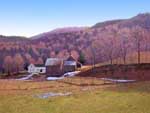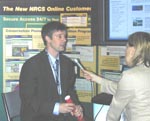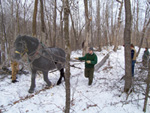|
| |
 
The Natural Resources Conservation Service —
Helping People Help the Land.
Subscribe to NRCS This Week
| NRCS This Week Articles Index | NRCS
This Week Archives |
Contact Us |
Where to Get Information
|
eNotes from
NACD |
 TSP Express (Requires Adobe Acrobat.) TSP Express (Requires Adobe Acrobat.)

Arizona
 NRCS Works with Navajo Nation to Improve Conservation Delivery NRCS Works with Navajo Nation to Improve Conservation Delivery
Arizona, Utah, and New Mexico NRCS State Conservationists Dennis Alexander,
Sylvia Gillen, and David McKay along with Regional Assistant Chief, West Sara
Braasch recently met with Navajo Nation Vice President Ben Shelly and other
Tribal leaders at the Tribe's Headquarters in Window Rock, Arizona, to discuss
ways to improve coordination, planning and implementation of conservation on the
Navajo Nation.
 Commodity
Classic 2007 Redux Commodity
Classic 2007 Redux
Listen to NRCS
Legislative and Public Affairs Division Director Doug McKalip
comment on the 2007 Farm Bill
in an interview with Cindy Zimmerman from Southeast AGNet at the 2007 Commodity
Classic in Tampa, Florida.
Minnesota
 Sugar
Bush Forest Stand Improvement Sugar
Bush Forest Stand Improvement
NRCS in Becker County, Minnesota, is partnering with the White Earth Land
Recovery Project (WELRP) and the Minnesota Department of Natural Resources (DNR)
in an effort to increase maple syrup production on tribal land. Maple syrup is
an important economic resource and its collection and processing is a source of cultural
integrity for the people of the White Earth Reservation as well.
Connect to
NRCS' State
News,
Newsroom, and
News Releases!

 New
Employee Suggestion Program Launched New
Employee Suggestion Program Launched
NRCS has launched the Streamlining and Cost Savings Initiative 2007
suggestion program. Initiated in 2003, the original program resulted in over 1,300 suggestions
from field office employees. For this second round of the streamlining
effort, NRCS providing an opportunity for employees throughout the agency to
make suggestions.
 March 2007 Is Women's History Month March 2007 Is Women's History Month
The
2007 theme, Generations of Women Moving History Forward, celebrates the
wisdom and tenacity of all generations of women. It recognizes
the power of generations of women working together.

 Soil
Survey Laboratory Soil
Survey Laboratory
George Phibbs in the Beltsville, Maryland, Soil Survey laboratory in 1960.
Laboratories assisted the Soil Survey in developing and implementing the new
soil classification system. (NRCS image — click to enlarge).
NRCS This Week features a weekly historical photo and
caption. NHQ, districts, States, RC&D councils, and all other NRCS
entities are invited to submit a historical photo
|


